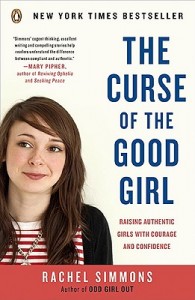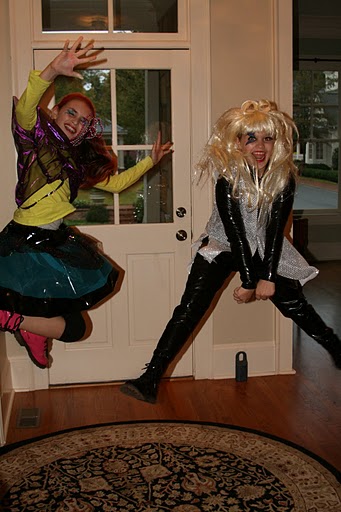 You better watch out . . .
You better watch out . . .
He’s making a list,
checking it twice,
gonna find out
Who’s naughty and nice.
He knows if you’ve been bad or good,
So be good for goodness sake!
Before we’ve even digested the Thanksgiving turkey, children are being reminded of who’s watching them. With toys and gifts on the line, behavior usually steps up a notch. I must admit, as much as I’ve never really liked the idea of being a snitch to Santa, I’ve dropped his name a time or two in total desperation.
But even if I hadn’t, I’ve certainly used “good” to describe my child before. They made a good decision, they showed good behavior, they were good boys or girls.
 Author Rachel Simmons believes this type of thinking is harmful to our children, particularly our daughters. In her book The Curse of the Good Girl: Raising Authentic Girls with Courage and Confidence, Simmons argues that “the most critical freedom we can give our daughters is the liberty not only to listen to their inner voice, but to act on it.”
Author Rachel Simmons believes this type of thinking is harmful to our children, particularly our daughters. In her book The Curse of the Good Girl: Raising Authentic Girls with Courage and Confidence, Simmons argues that “the most critical freedom we can give our daughters is the liberty not only to listen to their inner voice, but to act on it.”
I first was exposed to Simmons and her ideas when I took my daughters to hear her speak at our local high school. Before I attended, I wondered:
What’s so wrong with being good?
Simmons explains:
Being Good is a fundamentally self-limiting experience: the need to be ‘perfect’ and ‘do everything right’ leaves many girls uncomfortable with feedback and failure, making it difficult to push through a challenge. The need to be nice or right at all costs leaves these girls on the sidelines as they avoid the situations that aren’t sure things: moments of self-assertion that require healthy risk-taking and which might lead to failure, disappointment or another person’s unhappiness. (p 6)
Not only do Good girls avoid risk, they also avoid conflict and become pleasers. They think in all-or-nothing terms “If I am not nice, I am mean” (or as I view it “if I am not good, I must be bad/selfish”) and view every conflict as a threat to the relationship and personal. They then avoid it even at the cost of sacrificing their own needs.
The need to focus on how you seem to others, rather than who you are, is the Curse of the Good Girl in action. . . .
Taught to value niceness over honesty, perfection over growth and modesty over authentic self-expression, girls are locked into a battle with a version of themselves they can never attain. Their internal resources are drained by the energy and ruthless self-evaluation required to live up to this impossible set of personal standards. (pg 250)
I have spent most of my own life learning and living those values. In the LDS church (probably any church, this just happens to be the one I go to), there’s a lot of talk about what good people do, think, believe, dress, even value and desire. We take Christ’s admonition to be perfect quite literally, so when I go to Relief Society and we are talking about sin, the most anyone is willing to publicly fess up to is “when I read my scriptures daily, sometimes I don’t really ponder them.”
There’s an unwritten message that anything I do for myself at the expense of what I could be doing for someone else (other than those things that are on the “Good Girl Preapproved List” such as personal prayer, scriptures study, etc.) means I am being selfish.
 It’s almost as if we are scared that if left to our own desires and values, we will be out of control living with reckless abandon for all that is right and good (we all know the words of the Cyndi Lauper song, don’t we?).
It’s almost as if we are scared that if left to our own desires and values, we will be out of control living with reckless abandon for all that is right and good (we all know the words of the Cyndi Lauper song, don’t we?).
The antidote to being the Good girl according to Simmons is to be the Real girl. It goes back to what Laurie observed in Get Real that the key to spirituality is authenticity.
Simmons describes the Real Girl like this:
A Real Girl stays connected to a strong inner core of her thoughts, feelings and desires. She is able not only to listen to who she is but to act on it. She maintains a critical balance: she can mange the needs of others without sacrificing the integrity of her own. (pg 10)
She wants every girl to have the “tools and permission to be herself, whoever that is.” (pg 12, emphasis mine)
Do I have the courage to let my daughters be who they really are? I realized they don’t have a single example of this in their lives. From church to home life, they are constantly told what they should do and be. I decide what is a good grade, a good decision, a good girl, not them. And maybe it’s because I haven’t figured out how to really be me, whoever that is. Thus, the hardest words to read in the book were these:
Be the change you wish to see in your daughter. (pg 244)
I’m interested to know what role “Good” plays in your life. Where is the line between sharing our own values with our someone else and allowing them to be whoever it is they are?

Mel, holy cow! I love this post so much. I’ve added this book to my must-read list. Lots to think about here.
Great post. Maybe another way of being “real” is being “authentic”–a favorite word of mine. If we are constantly trying to live an aspirational life–a life that we’re told we SHOULD want to live–then we’re not really living, we’re pretending (that’s me applying some of the thoughts above to adults–and myself). Anyway, looks like a great book. I’m going to read it.
We were visiting with some friends last night who were raised Catholic/Baptist, but who have distanced themselves from their churches as adults and as they have become parents themselves. They were telling us that they overheard a family member tell their son one Saturday afternoon that it was time to get off the trampoline so they could get to church. The boy was obviously disappointed and asked why they had to go to church. His dad said: “Because that’s what we’re supposed to do.” Our friends were struck by that response and were telling us that they had decided that “because we’re supposed to” was just not a good enough reason for them.
And so then it was MY turn to be struck because I think I’ve spent my whole life using that as my reason/rationale for doing things.
They say we believe in anything lovely or of good report. Some of us are not meant to be like everyone else.
While I don’t think we should abandon the use of the word “good,” I remember hearing when my kids were little that using the term “good girl” or “good boy” was ambiguous, and that it’s better to comment directly on the specific action/thought that was “polite,” “kind,” “respectful,” etc. Children need to learn these things and practice them so they become part of their character. I love a quote I heard “You become what you want to be by consistently being what you want to become.” (Richard G. Scott) I t
I agree with Brent that being authentic is the key. It is so nice to be comfortable with who you are. I remember as a college student returning home one summer to Texas from BYU and having kind of a mini identity crisis. Out of necessity I took some time to ponder who I was in my core – what did I have to contribute. I came to understand that I enjoying being a good friend. That was enough.
I think it is wonderful when we are honest with our struggles and accepting of the wide range of delightful personalities that we find as we meet and interact with others. I think when we share these things with our children they become more accepting of themselves and free to be who they are.
@tbn, great point re: giving specific praise to your kids. Good reminder. It’s so easy to just say “You were good today” or “You did a good job.” Harder to be more thoughtful and come up with something that actually tells them WHAT was good about what they did.
@tbn – great point about sharing our own struggles with our kids, that way they see everyone is still a work in progress.
I wonder on your other point of “kind, polite and respectful” are all just substitutes for good? The way I have been teaching kindness, politeness and respect are all about being agreeable. I realize it is possible to be those things while being authentic, but sometimes the way they are construed for me comes back to being agreeable/good. I guess for me the key would be to pair any of those values with being real. How do we judge whether something is kind or not, by how it makes the other person feel or by whether we are doing it with their best interests at heart, or neither?
Simmons makes a point in the book about how women tend to leave conversations muttering what they wish they would have said. Part of it is because with such a focus on being good, we don’t learn how to express ourselves in constructive ways. A fair amount of time in the book is spent on communication skills and I think this is where you’d find the respect, kindness and politeness. She talks about how to help girls to be authentic without making others defensive, how to help them feel their emotions and to see the things that they are masking with those emotions, etc.
@Heather – on the issue of “should.” I have done a little revolting on the things I “should” do, but have found myself subject to the master of my whims, which isn’t really any better (what I “feel like” doing). For me, the key has been to figure out why I should do something and then realize that if I’m doing it because I want to (not necessarily feel like it at the moment) to own that. And if it’s not contributing to something I really aspire to or enjoy, to try to let it go (though I am still cursed by the Good Girl). So, I would have no problem telling my kid to get off the trampoline to go to church with the rationale of “because even though it would be more fun for both of us to stay outside, I want to worship and feel the sense of community that attending church every week gives me. When you’re an adult, you’ll get to decide if you want this is something you want as well.” (Of course I would never think of something like that on the spot J).
This is such an important point. I also think it illuminates tbn’s comment about politeness, consideration etc. I think we are teaching a principle behind certain actions — I don’t want my children to be polite and considerate because it is more convenient (althought it is), I want them to be considerate because they are aware of the feelings of others. It seems to me that being a good girl is getting that concept out of balance where the feelings of others are more important than your own.
Stepped away and thought about this more. I have no issue with being polite, kind and respectful because they are effective or because they are values we hold (this is likely what tbn is referring to??). I think I was resisting the being polite, kind and respectful in an effort for others to like/approve of you.
Funny story, one of my boys at age 18mos used “thank you” as his term for “will you give that to me?” (so if he saw a cookie, he would point to it and say “thank you”). It was amazing how effective it was. My other son at the same age used “mine” in the same way with very little luck :)
Although I mentioned kind, polite, respectful, because they were the first things that came to mind, other words like brave, assertive, and intelligent are also what we sometimes mean when we tell a child they are “good.” These are some of the innate character traits that we might want our children to acquire.
These may seem a like a trick of semantics, but I think it’s good to consider. I once heard of a study that says it’s better to tell a child they worked hard on a project than that they are smart. When faced with a more difficult challenge, the once you’d been told they “worked hard” kept with it longer and performed better than those who were told how “smart” they are.
I’ve also been thinking that it’s important to compliment both the gentler and the stronger character virtues in both our boys and girls. I see lots of young boys struggling to figure out where they fit in with expectations, probably because my son is very emotional (mind of an engineer, heart of a musician kind of guy).
It’s been a hard night putting my girls to bed tonight.. and just before I read this article, I told both my girls that they had been very naughty, and that they just needed to be good girls and stay in their beds and go to sleep… Arrrgghh!! I don’t want them to have the curse of the good girl, I want them to be free to be themselves.. but when that encroaches on what I want I find it really hard.. I just got a copy of this book given to me by Andrew’s aunt, really should get reading it.. maybe it could help me change things for my girls.. I definitely think quite a lot about how others would perceive what I do, I’m trying to get passed it, but it’s difficult.. not even sure if it’s possible to remove entirely.
Aww Hedge. This is definitely a no-guilt zone. I don’t think letting our children be free to be who they really are means they are free to roam the house at all hours of the day and night. I hope you enjoy the book as much as I did, Andrew must have a really cool aunt.
Mel, I read this post several times yesterday, went to bed thinking about it and woke up thinking about it — it is very powerful for me and I can’t wait to read this book.
I feel like I have been trying to overcome this my whole adult life — not out of wisdom, but necessity. The tricky thing with my own daughters is realizing how easy it is to convey this message. I came from a loving home where I truly felt celebrated, but my parents (especially as young people) were both locked in this struggle with being perfect and good, as were my grandparents and most of the women I knew at church. There are such rewards for being a good girl in school, at church, with boys and friends, it’s difficult to see the toll it takes on your mental health and well-being. I’ve spent most of my life being a praise junkie and, despite all I know, I sometimes fall right back into the trap of ruthless self-evaluation and perfectionism. But, I’m getting better. Authenticity builds upon itself.
I also really need to read this book. There was a discussion on The Exponent a few days ago about this book as well.
It seems like this post and book succinctly show just how the burden of male privilege is heaped upon women. Women are expected to keep the peace, smooth things over, be quiet, bide their time, etc. We don’t even realize that we are expecting that of ourselves (if we are women) and other women and girls in our lives. We are so much more than that. Women deserve to be full individuals, not peripheral supporting actors in male lives.
I’ve spent my whole life being the Good Girl, and I struggle every day to find a more intrinsic value in myself and not base it on how perfect I can be as judged by others. Like Heidi, I think I’m getting better at it. My parents are such Good people, but always polite, never rocking the boat if that meant being standing up for their authentic selves. I don’t have ANY idea who my father is authentically, and as I get older it makes me sad.
@Mel, that is so funny your son used “thank you” like that. My 20 mo-old daughter uses “thank you” as a way of getting out of things. She gets caught doing something she shouldn’t be (getting into makeup, climbing on a chair) she chimes “Thank you!” like it’s is an automatic ‘get out of jail’ card. How do they do that?! :)
Still thinking about this post and wanting to read the book. Came across this Orson Welles quote tonight that reminded me of it again:
“I don’t say we all ought to misbehave, but we ought to look as if we could.”
And this one: “If you obey all the rules, you miss all the fun.”–Katharine Hepburn
These come from a cute little board book called Dream Big, starring Olivia. My kids get a kick out of Olivia.
“A year from now, ten? They’ll swing back to the belief that they can make people… better. And I do not hold to that. So no more runnin’. I aim to misbehave.” -Malcolm Reynolds, Serenity
Other than that, all I have to add is that my daughters will be helping to make a new world where they are in charge.